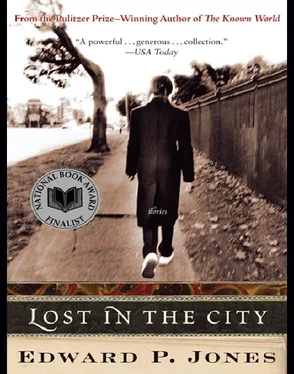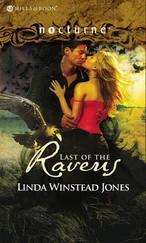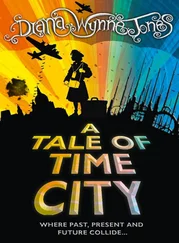It took me three days to clean out my life from Kentucky’s place. She stayed at work until I had finished each day. And on each of those days, I left a note telling her I wanted to stay.
I suppose any man could take rejection by any woman as long as he knew that the morning after he was cast out, the woman would be bundled up with her best memories of him and taken away to a castle in the most foreign of lands to live there forever, guarded by a million eunuchs and by old women who had spent their lives equating sex with death. No, no, the woman would have to say to the old women for the rest of her life, I remember different.
If you approached Al’s and Penny’s Groceries coming down O Street from 6th you could see the bright new orange color I myself put on, a color announcing to the world an establishment of substance, a place I tried to make as friendly as a customer’s own home. Joy and Tommy and Tommy’s father moved away when the paint was still fresh and bright. And it was still bright when Mrs. Baxter went on to her reward, and though she had not been in the store since the day I told her not to come back, Penny had me send flowers to the funeral home in both our names. The paint was still radiant when the babies I was godfather to learned to walk in the store on their own and beg for candy from me.
One evening — the season it was is gone from my mind now — I let Puddin go home early. Alone in the store, I sat on my high stool behind the counter, reading the Afro , a rare treat. At one point I stood to stretch and looked out the O Street window to see Penny, with shorter hair and in her apron, looking in at me. I smiled and waved furiously and she smiled and waved back. I started from behind the counter and happened to look out the 5th Street window and saw my father coming toward me. When I saw that he too had on an apron, I realized that my mind, exhausted from a long day, was only playing tricks.
I do not know what would have happened had Penny not decided to sell. Perhaps I would be there still, and still going home each evening with the hope that I would not see, again, Kentucky arm-in-arm with someone else. Penny and I had continued to meet in her car about once a week. The night she told me she was selling the place, we met on Q Street, between 5th and 6th. And the very last meeting was on O Street, in front of Bundy’s playground. From meetings far, far from the neighborhood, we had now come to one that was just down the street from the store. I came out of the store about midnight, locked it, stepped back to take one final look at the place as I usually did, and walked only a few yards. In a few minutes, Penny drove up.
“You been a good friend to me,” she said as soon as I got in the car. She handed me two envelopes — one with a month’s pay for Puddin and the other with four thousand dollars for me. “Severin pay,” she said. “Don’t spend it on all the whores, for a man does not live on top of whores alone.”
She hugged me, kissed me hard on the cheek. After a while, I got out and watched her make a U turn and go back down the way she had come. I had a feeling that that would be the last time I would ever see her and I stood there with my heart breaking, watching her until I lost her in the night.
The next week I took the G2 bus all the way down P Street, crossing 16th Street into the land of white people. I didn’t drive because my father had always told me that white people did not like to see Negroes driving cars, even a dying one like my Ford. In the fall, I was sitting in classes at Georgetown with glad-handing white boys who looked as if they had been weaned only the week before. I was twenty-seven years old, the age my mother was when she married. Sometimes, blocks before my stop on my way home from Georgetown in the evening, I would get off the G2 at 5th Street. I would walk up to O and sit on the low stone wall of the apartment building across the street from what had been Al’s and Penny’s Groceries. The place became a television repair shop after it stopped being a store, then it became a church of Holy Rollers. But whatever it was over the years, I could, without trying very hard, see myself sitting in the window eating my lunch the way I did before I knew Kentucky, before Pat was killed. In those early days at the store, I almost always had a lunch of one half smoke heavy with mustard and a large bottle of Upper 10 and a package of Sno-Ball cupcakes. I sat on the stone wall and watched myself as I ate my lunch and checked out the fine girls parading past the store, parading as if for me and me alone.
AN ORANGE LINE TRAIN TO BALLSTON
The first time Marvella “Velle” Watkins saw the man with the dreadlocks, rain threatened and she just managed to get herself and her three children down into the subway before it began. The rain was waiting for them at the end of their trip. On the crowded Stadium-Armory subway platform, she held Avis, the baby, by the hand, lest the girl wander off, and Marvin, the oldest, stood on his mother’s other side. Marvin was looking into the tunnel out of which the train would come. He held his bookbag under one arm and looked down at the lights that were flush with the floor and whose blinking would indicate the approach of the train.
“How do the lights know when the train is comin?” he asked his mother.
This was a new question. “I don’t know,” she said. “Avis, stop kicking like that.” The girl continued to kick out at something imaginary in front of her and Marvella tugged at her arm until the girl stopped. “I guess,” she said to Marvin, “that way down the line the moving train hits something on the tracks and that tells the lights ahead to start blinking.”
Marvin seemed satisfied with the answer. He studied the lights and as he did they began to blink. The boy was nine. My son the engineer, his mother thought.
On the other side of Avis stood Marcus, her second son. Marvella noted out of the corner of her eye that he was yapping away, as usual, and at first Marvella thought he was talking to Avis or having another conversation with himself. “Everybody else is borin,” he said to her the first time she asked why he talked to himself. He was now seven. Long before the train came into view, it sent ahead a roar, which always made Marvella look left and right to make certain her children were safe and close. And when she turned away from the coming train, she saw that Marcus had been talking to the man with the dreadlocks.
Marcus and Avis managed to find seats just in front of their mother, and she was surprised when the dreadlock man sat down beside her. Marvin found a seat on the aisle across from his siblings. Beside the boy was a woman as old as Marvella’s mother, asleep, her head leaning against the window. For a few seconds Marvin looked at the old woman, then he opened his bookbag and took out a piece of paper.
The subway man running the train announced through the speakers in the ceiling that this was an orange line train to Ballston.
Marcus, after sitting for a few seconds or so, turned around and knelt in his seat, facing the man with the dreadlocks. Being so small, he hadn’t been able to get a good look at the dreadlocks while he stood beside the man on the platform, but now he was closer and more or less head-to-head with the man and he planned to take advantage of the situation. I should tell him to turn around, his mother thought, but this might be one time when he’s justified. Avis, a head or so shorter than Marcus, followed her brother’s example and was staring at the man as well. A minute or so won’t hurt, Marvella thought.
“Why you got your hair like that?” Marcus asked the man.
“You don’t have no comb or nothin?” Avis asked him. “My mama wouldn’t do my hair like that.” Avis was four and on any given day had a different answer about whether she liked the idea of going to school next year.
Читать дальше












